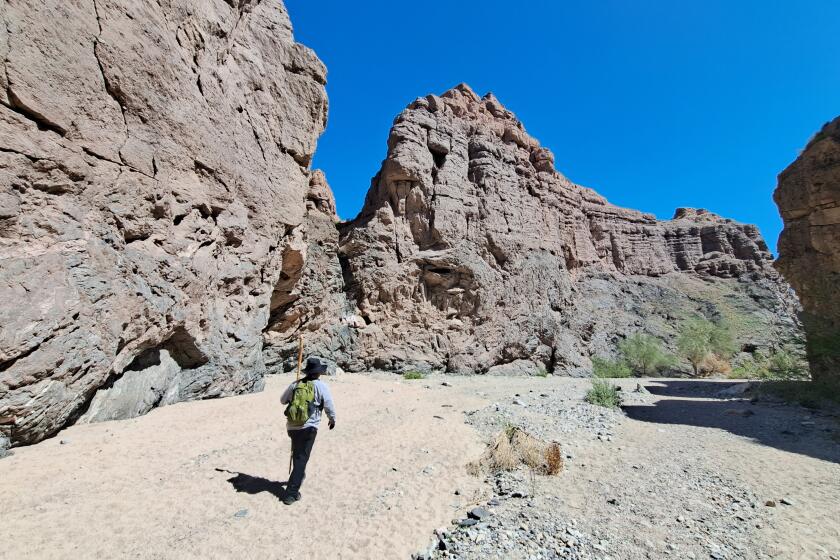Policing online traffic schools
When it comes to online traffic schools, you’d figure a strong regulator is needed to oversee an industry some say is rife with cheating, with stay-at-home students Googling test answers or having others take courses in their place.
In Los Angeles, that regulator is . . . the county Housing Authority.
And equally unsuitable overseers can be found throughout California thanks to a legislative quirk authorizing the state Department of Motor Vehicles to regulate nearly 400 brick-and-mortar traffic schools -- but not their online counterparts.
According to the DMV, county courts have had the authority since the late 1980s to approve “home study” traffic schools for the elderly and disabled people. Those schools were originally correspondence courses but have given way to online programs available to everyone.
The catch is that California’s courts don’t have the resources to oversee online traffic schools. So for years they’ve outsourced the task to others.
As a result, online traffic schools statewide are now monitored by a hodgepodge of public and private entities. That’s where the L.A. County Housing Authority comes in.
Frank Medina, who runs the Housing Authority’s traffic-school program, said that in the most recent fiscal year, more than 200,000 L.A. County residents enrolled in electronic courses offered by 82 locally based online traffic schools.
That compares with nearly 193,000 people who opted to attend one of the 154 brick-and-mortar schools in the region.
“The number of brick-and-mortar traffic schools has been steadily declining,” Medina said, “while the number of home-study schools has been going up and up and up.”
As much as he’d like to rigorously police the online schools, Medina just doesn’t have the resources. His agency has its hands full with its main job: providing homes to low-income people.
“For all we know, the one taking the course could be your kid or grandkid,” Medina acknowledged. “We need to nail down that the one who gets the citation is the one taking the class. But that takes money.”
My interest in traffic schools resulted from a recent incident involving a stop sign at which my car may or may not (mostly not) have come to a complete halt before making a turn.
Traffic schools allow drivers to address black marks on their records. Attending an eight-hour class can prevent your insurer from learning of an infraction and thus keep your premiums from going up.
I qualified for online traffic school but chose to spend eight hours with 31 other scofflaws at Comedy Traffic School in a stuffy room off La Cienega Boulevard. The school promised “hilarious instructors.”
Our instructor, Brian Laughlin, a bald-headed former clown, wasn’t exactly hilarious but he was amusing, with a comedic style that blended the gruffness of Lewis Black with shameless, Bill Cosby-style mugging.
More important, he gave out the test answers as the day progressed and then didn’t bother giving us the final test at all, which the DMV subsequently told me was a no-no. I figured this was $35 well spent.
Laughlin, 43, said online traffic schools represent a real threat to his livelihood.
For one thing, they cost only about $20. Then there’s the convenience.
“Why would anyone sit in class for eight hours if they can finish the course online in less than half that time?” Laughlin asked.
Medina said online schools are experimenting with ways to make people sit in front of their computer screens for the requisite 400 minutes, but most courses still can be skipped through by anyone in a hurry.
He also said online schools try to ensure that the right person is taking the course by asking a series of personal questions at the outset and then repeating the questions at intervals.
“That way, you won’t be able to finish the course unless you know the answers,” Medina said.
But what if someone simply provides the answers to a proxy class taker?
“That’s a possibility, sure,” Medina allowed.
It’s silly to think that the L.A. County Housing Authority or any other local entity can regulate this fast-growing industry. This is a job that requires a statewide authority, and that authority is obviously the same one overseeing all other traffic schools -- the DMV.
Steve Haskins, a DMV spokesman, said it could strain the department’s resources to add online traffic schools to its regulatory duties. “The pie only slices in so many ways,” he said.
“But if the Legislature wants us to regulate online schools,” Haskins said, “we’re happy to do it.”
Lawmakers should take up the DMV on its offer. For that matter, why isn’t the DMV offering its own traffic courses?
If most private traffic school courses cost about $35, and hundreds of thousands of Californians are attending them each year, I’m thinking this can be a pretty substantial revenue generator for the DMV at a time when spare cash is hard to come by.
I’m also thinking that until someone figures out how to make online traffic schools more cheat-proof, perhaps the answer is to require that electronic courses be taken in specific venues, such as a public library, where a little supervision can be provided.
As we graduated from Comedy Traffic School, Laughlin handed each of us a $3-off coupon for the next time we need to enroll in his class. It was also good for the school’s online offerings.
Next time, if there is a next time, that’s the way I’m going.
--
David Lazarus’ column runs Wednesdays and Sundays.
Send your tips or feedback to david.lazarus@latimes.com.
latimes.com/lazarus/trafficschool
Discussion
Do online traffic schools need tighter regulation?
More to Read
Start your day right
Sign up for Essential California for news, features and recommendations from the L.A. Times and beyond in your inbox six days a week.
You may occasionally receive promotional content from the Los Angeles Times.







